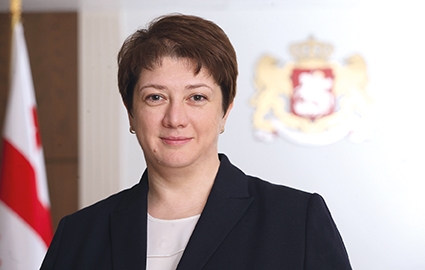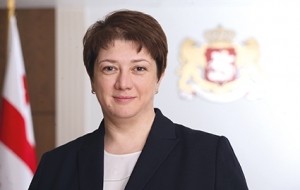Minister of Regional Development Shares Vision for Development Outside Tbilisi
Minister of Regional Development and Infrastructure and Deputy Prime Minister Maia Tskitishvili has published a new article in the Georgian language edition of The Economist magazine. In the article, published this week, Tskitishvili explains the priorities and key policies of the Ministry of Regional Development and Infrastructure (MRDI) and her vision for the future of Georgia’s regions.
The piece opens with a note on accountability. Tskitishvili and her team presented the Ministry’s achievements in 2018 and near-future plans to the public in January. Just two weeks ago, Tskitishvili visited Parliament in the framework of the new “Minister’s Hours” format, established by the new constitution, which came into force in December of last year. During her visit, she briefed the members of Parliament on the Ministry’s work.
“The name of our ministry already determines the main priorities of its activities. This is the development of our regions and the country's infrastructure,” Tskitishvili bluntly states at the beginning of the article.
She is committed to her ministry’s role in developing Georgia’s regions, expressing that “the strength of Georgia is in the strength of its regions and the task of the government is to develop regions equally, and to create new opportunities.” She highlighted the importance of job creation to help bring rural areas out of poverty and make the regions a more attractive place to live. Her ministry, and others, are enacting a variety of projects aimed, to some degree, at job creation – vocational and higher education reforms, tax incentives, entrepreneurship training programs, business grants schemes, and more. Tskitishvili also impressed that economic growth must be inclusive and evenly distributed throughout the country, including “even the smallest settlement.”
“In addition to infrastructure, strong self-governance is necessary for the development of the regions,” noted Tskitishvili. The MRDI is introducing programs to increase the financial and human resources of the regions, promoting political and fiscal decentralization and good governance, in cooperation with other ministries and government agencies. She warned against the fragmentation of development, particularly in the realm of infrastructure, saying that collaboration, communication, and joint strategies are essential “to fully utilize the regions’ potential.”
The MRDI strategically looks at Georgia’s history to identify potential development hot spots, targeting old resorts, such as Abastumani and Dusheti, for renovation and revival, hoping to create a tourist-driven eco-system for a variety of businesses to thrive. The ministry is also working to turn Gudauri into a “new center of gravity” for tourism in eastern Georgia, attracting new investments. “We have such a vision for the development of all regions of the country,” Tskitishvili wrote, listing several other planned and ongoing projects, including the David Kakabadze Fine Art Museum in Kutaisi, the Vani Archaeological Museum, the German-settled village of Asureti in the Tetritskaro Municipality, a new museum in Oni, Racha, the Zugdidi Botanical Garden, and the development of Bakhmaro as a four-season resort.
In the piece, she recognizes that there is a long way to go before the country’s potential can be fully realized. “Unfortunately, we are still busy building basic infrastructure in many settlements. There are villages where there are no internal roads or water,” she lamented.
The article closes by connecting the development of Georgia’s region to the development of the wider Black Sea/Eurasia region as a whole. She emphasized the value of foreign trade and Georgia as a trade route linking Europe and Asia, “the transport and economic corridor of the region.”
“The development of [major national highways] allows us to use our geographical and historical links to the economic strength of our country,” wrote Tskitishvili; “and yet, first of all, these roads connect the regions of our country with each other and give them new opportunities, additional prospects. Georgia's regions have a chance to integrate into the world economy.”
The full article is available, in Georgian, in the current edition of the Georgian language edition of The Economist.
By Samantha Guthrie
Image source: Ministry of Regional Development and Infrastructure











